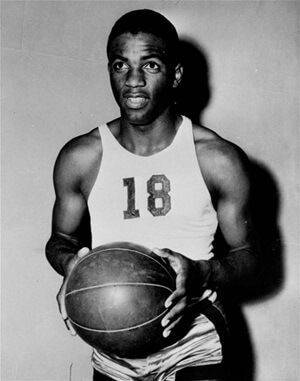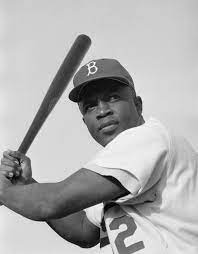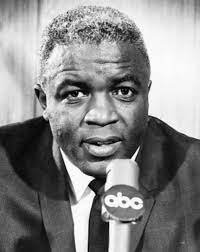Jackie Robinson

Jack Roosevelt Robinson, an American professional baseball player who played from January 31, 1919, through October 24, 1972, was the first African American to play in Major League Baseball (MLB) in the modern era. Breaking baseball's colour barrier, Robinson began at first base for the Brooklyn Dodgers on April 15, 1947. The signing of Robinson by the Dodgers marked the end of racial segregation in professional baseball, which had kept black players in the Negro leagues since the 1880s. In 1962, Robinson received a nomination for the Baseball Hall of Fame. Throughout his ten-year MLB profession, Robinson made his background by being the initially black gamer to win the Nationwide Organization most Important Gamer Honor in 1949, winning the inaugural Novice of the Year Honor in 1947, and being called to the All-Star Ready 6 succeeding periods from 1949 to 1954. Robinson participated in six World Series, helping the Dodgers to victory in 1955.
He was the first professional athlete to get such an accolade when MLB decided to retire his uniform number 42 across all teams in the most significant league in 1997. On April 15, 2004, MLB also instituted a new yearly custom known as "Jackie Robinson Day," on which every team member wears the number 42.
Robinson challenged the standard foundation of segregation that had characterized many facets of American society at the time through his temperament, nonviolent tactics, and brilliance. Robinson won the Congressional Gold Medal and the Presidential Medal of Freedom in honour of his achievements on and off the field following his demise in 1972.
Personal life and family
In Cairo, Georgia, on January 31, 1919, Jack Roosevelt Robinson was born into a sharecropper family. After his brothers and sisters Edgar, Frank, Matthew (sometimes known as "Mack"), and Willa Mae, he was the youngest of the five teenagers Mallie (McGriff) and Jerry Robinson had given birth to. Theodore Roosevelt, a previous president who passed away 25 days earlier than Robinson was born, is remembered in his middle name. When Robinson's father abandoned the family in 1920, the family moved to Pasadena, California. The extended Robinson family moved into two modest homes on a residential lot at 121 Pepper Street in Pasadena.
Robinson's mother worked a variety of odd jobs to support the family. Robinson and his minority friends had been shut out of numerous recreational possibilities as children growing up in relative poverty in an otherwise wealthy neighbourhood. As a result, Robinson joined a local gang, but his friend Carl Anderson convinced him to leave.
John Muir Senior High School
- Robinson entered John Muir High School after graduating from Washington Junior High School in 1935. (Muir Tech). Older brothers Mack and Frank Robinson, both accomplished athletes and silver medalists in the 1936 Summer Olympics, encouraged Jackie to pursue his interest in athletics after realizing his athletic potential.
- In 1936, Robinson took home the junior boys singles title at the Pacific Coast Negro Tennis Tournament. Additionally, he was selected to play on the Pomona annual baseball tournament all-star squad alongside future Hall of Famers Ted Williams and Bob Lemon.
- The Pasadena Star-News said that Robinson had been Muir's top athlete for two years, excelling in baseball, football, basketball, track, and basketball.
College Junior of Pasadena

- After graduating from Muir, Robinson resumed his athletic pursuits at Pasadena Junior College (PJC), where he competed in basketball, football, baseball, and track.
- He played safety and quarterback for the football team, and he played shortstop and batted leadoff for the baseball club.
- Robinson injured his ankle while playing soccer at PJC; the subsequent difficulties would eventually stretch his military record for deployments. He was previously selected as the baseball All-Southland Junior College Team's Most Valuable Player in 1938.
- Robinson was one of ten college students named to the organization's Order of the Mast and Dagger (Omicron Mu Delta) that year. He was also chosen to the Lancers while attending PJC, a student-run police force in charge of policing various academic events.
- A PJC episode exemplified Robinson's frustration with authorities whom he viewed as racist-a personality characteristic that would again recur throughout his life. He was detained on January 25, 1938, after publicly criticizing the police's incarceration of a black buddy. Despite receiving a two-year suspended sentence, Robinson developed a reputation for being aggressive in the face of racial hatred. He was inspired to regularly attend church while attending PJC by a preacher (the Rev. Karl Downs), who later became a confidant to Robinson, a devout Christian.
- After his PJC sentence, Frank Robinson, the sibling whom Robinson felt the closest to among his three brothers, passed away in a motorcycle accident. Jackie decided to continue his sports career at the nearby University of California, Los Angeles (UCLA), where he could live closer to Frank's family after the incident.
UCLA, and Afterward

- A UCLA song uniformed athlete lunges forward toward a classroom building. Robinson competed for UCLA in the long jump and made school history by earning varsity letters in four sports.
- He was one of the four black players on the Bruins' 1939 football squad, Woody Strode, Kenny Washington, and Ray Bartlett. The club had four backfield players, with Washington, Strode, and Robinson making up three. This made UCLA university football the most diverse squad at a period when just a few black students participated in conventional college football. They had a perfect record of 6-0-4 with four ties.
- As of 2022, Robinson set the collegiate football record for the most significant potential rushing yards per carrying in a season with 12.2 yards per attempt on 42 runs.
- In the 1939 and 1940 seasons, Robinson also finished first in the NCAA for punt returns.
- Robinson won the 1940 NCAA long jump title with 24 feet, 10, 14 inches in track and field. Baseball was once Robinson's "worst sport" at UCLA; despite going 4-for-4 and stealing two bases in his first game, he only played in one season and hit.097.
- In his final year at UCLA, Robinson met Rachel Isum, his future wife, a freshman at UCLA who was aware of Robinson's PJC sports career. He played football as a senior, but the 1940 Bruins only had one victory. Despite the objections of his mother and Ipsum, Robinson graduated from college just a few weeks early in the spring. He accepted a position with the National Youth Administration (NYA) of the federal government in Atascadero, California, as an assistant athletic director.
- Robinson moved to Honolulu in the fall of 1941 to play football with the racially mixed semi-pro Honolulu Bears when the government stopped the NYA's activities.
- Following a brief season, Robinson returned to California in December 1941 to pursue a career as a running back for the Los Angeles Bulldogs of the Pacific Coast Football League. However, Robinson's fledgling soccer career was put on hold when the Japanese assault on Pearl Harbor brought the United States into World War II.
Military Career
- Robinson joined a segregated Army cavalry regiment at Fort Riley after being recruited in 1942. Robinson and several other black troops who met the requirements submitted applications to Fort Riley's Officer Candidate School (OCS), accepting applications. Although the Army's original OCS regulations from July 1941 were designed to be race-neutral, few black candidates were accepted into the program until further orders from Army leadership.
- Robinson joined the 761st "Black Panthers" Tank Battalion at Fort Hood, Texas, after being sent there after getting his commission. Robinson's military career was ended by an incident on July 6, 1944. Robinson and a fellow officer's wife boarded an Army bus; however, the bus driver instructed Robinson to pass to the vehicle's rear despite the Army having its own desegregated bus line. Robinson was monitoring the results of hospital tests on his fractured ankle in junior college, and Robinson snubs. The driver yielded, but after reaching the end of the line, he called the military police, who arrested Robinson. Robinson then challenged the investigating duty officer about the officer and his assistant's racial interrogation, and the officer suggested Robinson should face court-martial.
- Robinson was promptly reassigned to the 758th Battalion when his commander in the 761st, Paul L. Bates, refused to approve the criminal action. There, the commander swiftly agreed to charge Robinson with many violations, including public intoxication, even though Robinson had stopped drinking. The charges against Robinson had been lowered to two counts of insubordination throughout the questioning by the time of the court-martial in August 1944. A panel of nine police officers, all of whom were white, found Robinson not guilty.
- Robinson's old outfit, the 761st Tank Battalion, became the first black tank battalion to engage in combat during World War II. Still, he could not be sent overseas due to court-martial proceedings and never saw battle. He was then sent to Camp Breckinridge, Kentucky, following his acquittal, where he worked as a coach for the navy's sports program until he was honourably discharged in November 1944. Robinson saw a former Kansas City Monarchs player there, who gave Robinson the idea to get in touch with the team and ask for a tryout. Robinson wrote to Monarchs co-owner Thomas Baird on the advice of the former player.
Life After Retirement

- Robinson allegedly said to Hank Aaron, who would subsequently be elected into the Hall of Fame, "The sport of baseball is amazing, but the nicest thing is what you do once your career is ended." Robinson, at 37, announced his retirement from baseball on January 5, 1957.
- Later that year, after complaining of severe physical discomfort, he was given the same diagnosis as his brothers: diabetes. Robinson started taking insulin injections, but the medicine kingdom at the time could not stop the disease's physical condition from continuing to deteriorate.
- In October 1959, Robinson visited the Greenville Municipal Airport's whites-only waiting area. Through airport security, Robinson was asked to leave, but he resisted. Robinson called for "full freedom" during a National Association for the Advancement of Colored People (NAACP) address in Greenville, South Carolina. He also encouraged black Americans to vote and oppose their second-class status. The airport was shortly integrated after a march of about 1,000 people on New Year's Day the following year.
- Robinson convinced voters to ignore his cultural influence on baseball in 1962, his first year as a candidate for the Baseball Hall of Fame, in favour of focusing only on his on-field exploits. The first black player to be admitted into the Cooperstown museum, he was elected on the first ballot.
- Following Robinson's baseball retirement, he sought a career in educational nursing, ascending to the nursing director and assistant professor positions at the Connecticut Mental Health Center. Their three children were David Robinson, Sharon Robinson, and Jackie Robinson Jr., who lived from 1950 to 1971.
- Jackie Robinson Jr., the eldest son of Robinson, struggled emotionally as a youngster and began attending special schools at a young age. In pursuit of a structured environment, he joined the Army, saw action in the Vietnam War, and sustained a wound while in motion on November 19, 1965. He battled drug issues after being released from the hospital. Robinson Jr. eventually completed Daytop Village's rehabilitation program in Seymour, Connecticut, and progressed to become a counsellor there. He was 24 years old when he died in an automobile accident on June 17, 1971. Due to his son's drug addiction, Robinson Sr. transformed himself into an aggressive anti-drug advocate at the end of his life.
- Robinson did not outlast his kid for a significant amount of time. He had a heart attack in 1968, and Robinson had diabetes and coronary heart disease complications, which had rendered him blind by middle age. Robinson, 53, succumbed to a heart attack on October 24, 1972, at his home on 95 Cascade Road in North Stamford, Connecticut.
- On October 27, 1972, 2,500 people showed up for Robinson's memorial ceremony at Morningside Heights' Riverside Church in Upper Manhattan. The Rev. Jesse Jackson delivered the eulogy, while several of his former colleagues, other well-known baseball players, and Celtics legend Bill Russell served as pallbearers.
- Thousands of mourners lined the path of the next procession to Robinson's last resting place in Brooklyn's Cypress Hills Cemetery, where he was laid to rest alongside his son Jackie and his wife's mother, Zeller Ipsum.
|




 For Videos Join Our Youtube Channel: Join Now
For Videos Join Our Youtube Channel: Join Now









